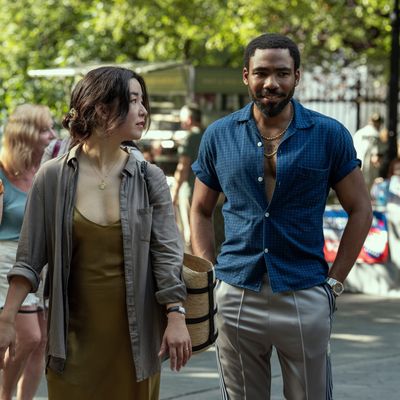
Going into Mr. & Mrs. Smith, I had a lot of skepticism. Despite Francesca Sloane’s insistence that there was a new story worth telling here, the first couple of episodes didn’t fully convince me. The original movie was never a masterpiece, but it was good, sexy fun and sustained by a once-in-a-lifetime pairing of movie stars. The new series had no real reason to exist, even (or especially) with a totally different tone.
But I started really having fun with this show sometime around “Double Date,” and this episode is even better. I’m still not sure Mr. & Mrs. Smith is really a five-star type of show, but “Couples Therapy” strikes me as the most successful example yet of what Sloane is trying to pull off, both comedically and dramatically.
I’ve had some issues with the plotting on this show, but the intensely episodic structure is one of the main reasons it works well. There may not be much of an ongoing serialized story outside the actual relationship arc — I’m still unsure what to expect when it comes to a theoretical confrontation with the big boss — but that choice allows for a lot of freedom. There’s space for an episode like this one, focused entirely on a husband and wife making an honest effort to talk through their issues.
To be fair, I’m always a sucker for a therapy episode, so I knew I’d dig this immediately, especially with Sarah Paulson as the quirky couples therapist. (She had the wood floor from her childhood home flown in.) John and Jane’s first session picks up where the two left off in the last episode: arguing about having kids and arguing about how much their boss favors Jane. She turned down Hihi’s offer to replace John, but John still can’t stand how controlling she is during missions.
“Couples Therapy” features three different therapy sessions, with flashbacks to other missions embedded within each one. It’s a smart way of breaking up all the dialogue with some spywork. In the first mission — an example of Jane being controlling — John takes lead, infiltrating a poker group and posing as the cousin of a friend. It’s nice to see John in a social setting again; he’s performing as part of a mission, but in some ways he seems more at ease than usual, shooting the shit about copaganda, Mýa, Latina women, and yoga. Jane gets impatient and starts firing early, and soon John is the only one alive in the room.
I do wonder about morality in this show sometimes. Are we to understand that these three men “deserved” to die in some way? It’s harder to feel that way after spending some time with them, unlike the anonymous masked shooters whom John and Jane usually deal with. What exactly was the mission here, and is there a reason Jane shot the two unarmed men first, forcing John to shoot the armed one?
Of course, the men who died don’t really matter. This is all about how John and Jane’s behavior makes each other feel. Jane thinks her husband uses sexism and anti-Asian racism to connect with other men. John thinks she’s uncomfortable and jealous of his effortless ability to “bond with Black people.” Meta concerns aside — again, Google “Donald Glover Asian” for more info — it’s an interesting, realistic conflict. And it ties back to Jane’s control issues; she’s worried that she’ll lose an essential part of herself if she lets her husband take the wheel more on missions.
Next week, they’re back and still in the same emotional place. This time, John has resigned himself to letting Jane answer the therapist’s questions. And the flashback mission is pretty brief: Jane let John take the lead during a chase, but his asthma kept him from catching up and she had to kill the guy herself. To psych herself into throwing him over the roof, she yelled, “Die, motherfucker!” John’s first reaction was to laugh hysterically, and Jane still takes it personally.
This leads to a moment of impressive honesty from John, who admits that he used to feel more secure and comfortable at the beginning when she still looked up to him. Jane assures him that he’s not holding her back, and she does look up to him. It seems like therapy is really starting to work for these two.
But we haven’t seen rock bottom yet. That comes during the third session when they recount that week’s disastrous off-the-grid “work retreat.” In flashback, we see John and Jane lost in the woods without service, eventually failing the mission when they can’t find their target before nightfall. John, still suffering from a terminal case of wounded masculinity, keeps trying to take charge and steer them in the right direction, but it doesn’t work. Then, as they’re camping out that night, Jane makes a reference to The Prophet and realizes John has never read it, contrary to what he claimed back in “Second Date.” He explains that he made it up because he was jealous of Hot Neighbor.
The fight that follows is pretty brutal — so candid and ugly and real and uncomfortable to watch. Once again, both accuse the other of being controlling, but it gets more specific and personal than that. In the last episode, Jane vowed never to judge John for how often he talks to his mom, but she breaks that vow when she trots out that old issue again. As is often the case, Jane is right in some ways — it’s dangerous for John and his mom to be in constant contact — but she comes across as really cruel in the way she says it, treating her husband like an idiot.
However, John retaliates explosively, criticizing Jane’s nonexistent relationship with her dad and claiming she only pretends to care about people. Again, like with Jane breaking her vow, it feels like a betrayal of sorts; John once told her he knew she wasn’t a robot, but now he treats her like one. The only way Jane can respond to it all is by pointing out a key discrepancy: John lists his mom as his emergency contact, while Jane lists him. From her point of view, she’s all in on this life, and John has one foot in the past.
Somehow, there’s still one more gut punch to come back in the present day. The therapist tries to comfort John and Jane by reminding them they always have the option of leaving. “No one is forcing you to stay together,” she says. “No one is holding a gun to your head. You can leave this relationship at any time. You are choosing to stay in it.” The bitter irony, obviously, is that they can’t leave this relationship at any time. It’s a disturbing reality that makes their marriage feel even more like a prison.
I’ve always taken it as a given that everything will work out fine for John and Jane at the end because, despite the questionable morality of their occupation, the show is usually on their side. We’ve seen them fall in love and spend time with them in their most intimate moments, and I’d be pretty surprised if the relationship just didn’t work out and they broke up. Still, the sheer venomousness of that fight really shook me, and the aftermath really leads us to question whether these two are right for each other. They got close quickly because of outlandish circumstances, but there’s no guarantee they have what it takes to last another year, let alone the rest of their lives. As Jane-2 once asked, would they have ended up together if the company didn’t arrange it that way? It’s a scary, thrilling question to contemplate with only two episodes to go.
Flaps and Seals
• John and Jane finally decide couples therapy isn’t for them after finding out the therapist has been secretly recording their sessions this whole time. In response, they burn down the house. RIP to her imported childhood floor.
• There’s something a little sad (and darkly funny) about the guys at the poker table discussing how yoga helps you stay spry later in life — moments before all of them die.
• Apologies for how many notes I’m about to include about Sarah Paulson, but c’mon. That story about averting her gaze at the sign of a mantled howler in Tortuguero was amazing.
• “So sorry about that.” “Oh, it’s no problem. He sounds sweet.” “He’s … disrespectful.”
• “It’s not my fault you have asthma.”
• Gotta love Sarah Paulson explaining what “out of pocket” means to Jane.
• Glover plays John’s awkward apology perfectly after the therapist reprimands him for playing her grandfather’s piano. And this line delivery from Paulson deserves some kind of award: “One of the Nazis loved to hear them play it. It saved their lives.”
• “John is a big-game hunter.”
• All the lies about John and Jane’s careers as software engineers are pretty funny, especially that argument when they start criticizing each other’s “files” and “malware.”
• Both “Double Date” and this episode made me crave an entire self-contained episode about a different Smith couple, maybe two people who actually don’t pursue a romantic relationship.
• Amy Seimetz directed this episode, so I should’ve known it would be the best one.


